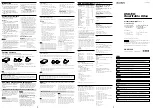
14 | CFW300
E
ng
lis
h
Installation and Connection
3.2.3.1 Input Connections
DANGER!
Provide a disconnect device for the inverter power supply. This device must cut
off the power supply whenever necessary (during maintenance for instance).
ATTENTION!
The power supply that feeds the inverter must have a grounded neutral.
NOTE!
The input power supply voltage must be compatible with the inverter rated
voltage.
Power factor correction capacitors are not needed at the input (L/L1, N/L2,
L3) and must not be installed at the output (U, V, W).
Power supply capacity
Suitable for use in circuits capable of delivering not more than 30.000 A
rms
symmetrical at (127
/ 240 V).
In case the CFW300 is installed in power supplies with current capacity over 30.000 A
rms
,
it is necessary to use proper protection circuits for those power supplies, such as fuses or
circuit breakers.
3.2.3.2 Power Supply Reactance
In a general way, the inverters of the CFW300 line can be installed directly in the power supply,
without reactance in the supply. However, check the following:
In order to prevent damages to the inverter and assure the expected useful life, you must
have a minimum impedance that provides a line voltage drop of 1 %. If the line impedance
(due to the transformers and cabling) is below the values listed in this table, we recommend
the use of a line reactance.
For the calculation of the line reactance necessary to obtain the desired percentage voltage
drop, use:
L = 1592 . ΔV .
V
e
[ μH]
I
s, rat
. f
Seeing that:
ΔV
- desired line drop, in percentage (%).
V
e
- phase voltage in the inverter input, in volts (V).
I
s, rat
- rated current of the inverter output.
f
- line frequency.
















































